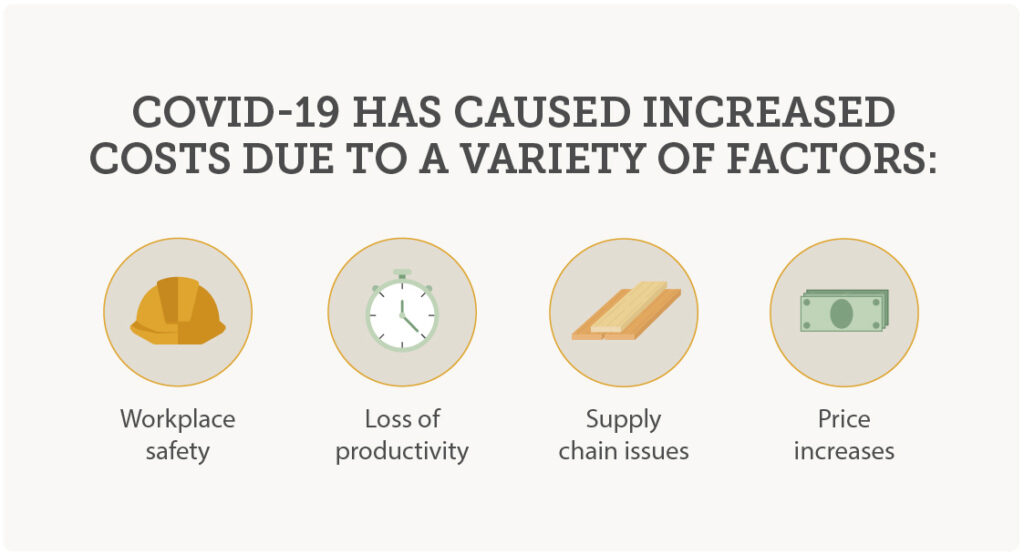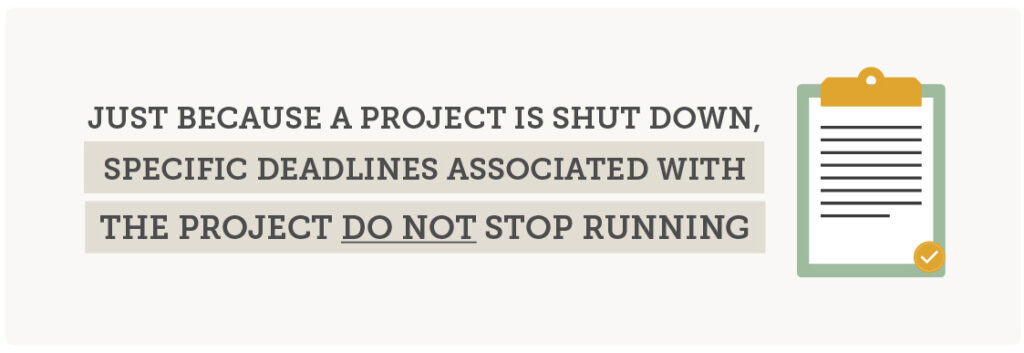The COVID-19 pandemic has impacted how all of us live and work as well as how companies conduct business. The demolition business in Oregon is no exception. Much more time, energy, and money is spent managing worker safety and disrupted project schedules.
As construction industry restrictions begin to ease, the overwhelming consensus is that policies and procedures will not look the same as they did pre-pandemic. We will review some of the challenges faced by demolition contractors over the past two years, then explore contract provisions that can help protect demolition companies against delays and claims associated with COVID-19.
Challenges Faced By Demolition Contractors in 2022
Before we dive into contracts, let’s examine common challenges construction and demolition contractors have been facing in the last several years.
Social Distancing
Social distancing at job sites has been a top priority at construction and demolition companies since the early days of the pandemic. These measures are expected to stay in effect indefinitely. In the months ahead, procedures will continue to be fine-tuned.
Supply Chain Disruptions
Global supply chain disruptions caused by COVID-19 overwhelmed the C&D industry in the U.S. Bricks, cement, and sand were nearly impossible to source over the pandemic’s early months, for example, because the virus took hold in China, the source of about 30% of building materials used in the U.S.
C&D Industry’s Skilled Labor Shortage
The construction and demolition industry faces a desperate shortage of skilled and qualified professionals. A model released in February by the Associated Builders and Contractors shows a need for nearly 650,000 workers on top of average hiring rates over the remainder of 2022.
Longer Project Timetables
Due to supply chain problems, social distancing, and labor shortages, fast-tracking demolition and construction projects became nearly impossible. All project team members, from owners to subcontractors, are dealing with the reality that project turnaround will be longer than before.
How Has the Pandemic Affected Demolition Contracts?
COVID-19 is affecting demolition contracts by causing increased costs due to a variety of factors, including:
- Personnel costs related to maintaining a safer workplace
- Loss of productivity due to illness, quarantine, and even child care issues
- Supply chain issues necessitating alternative vendors
- Price increases due to supply-and-demand

Additionally, government- and owner-imposed shutdowns have suspended some public and private projects. As a result, anticipated progress payments needed to fund operations have been curtailed. Some financially-distressed owners and general contractors have purposely slowed payments or even declared bankruptcy.
How Contracts Can Address Delays & Claims Associated With COVID-19
Contracts can include preemptive measures that specifically address delays and claims associated with COVID-19. Here we share some of the issues that demolition contractors need to consider to ensure they are financially protected from any projects impacted by pandemic-related issues.
Force Majeure
Most contracts contain clauses that outline responsibility for various delays. Delays caused by something outside of the control of either party are called “force majeure” delays.
There are two versions of force majeure clauses:
- A list of force majeure delay examples that include a catch-all phrase such as “or anything else outside of the control of either party”
- A specific listing of every type of calamity considered a delay for force majeure
At the height of the U.S. National Emergency, the global pandemic usually fell within the “catch-all” provision. Clauses with narrower language can force litigation to determine if the pandemic’s specific status at the relevant point meets force majeure criteria.
Sometimes, the contractor may get an extension of time but no relief for the additional costs caused by the extra time needed to complete obligations.
Work Suspensions
Rather than deal with COVID-19 delays and associated costs, the owner may suspend work on a bonded demolition project until impact severity has decreased. This is particularly applicable in cases of local government shutdowns.
Regarding suspension, contract clauses often include provisions to adjust the timetable and payments to account for increases in time and cost caused by suspension, delay, or interruption. The contract adjustment typically also includes profit, as long as the demolition company is not responsible for the suspension or delay.
Termination for Convenience
COVID-19 social restrictions particularly impact private sectors such as hospitality and retail. In light of these, owners may terminate construction, renovation, or demolition contracts for convenience. In other words, the owner considers the project no longer viable due to COVID impacts.
In these cases, the termination language determines whether the contractor will be compensated for any work not yet performed or anticipated profits. Termination for convenience eliminates performance bond claims for performance delays, but payment bond claims may still proceed if the contractor cannot successfully negotiate settlements with lower-tier vendors.
Project Site and Deadline Protection
Just because a project is shut down, specific deadlines associated with the project do not stop running. Time period deadlines, limitations, and mechanic’s liens continue to run unless there is some sort of government intervention. It’s critical to identify and preserve deadlines for claims notices, delays, impacts, lien rights, change orders, equitable adjustment requests, insurance claims, and rights to dispute resolution.

To preserve rights and claims, contractors and their sureties must adequately document all impacts. Pay special attention to keeping track of the COVID-related effects and costs so that any claims, notices, or requests are supported.
If the project is shut down, the contractor must follow contract-specified requirements for protecting the site, materials, equipment, work, and others against damage, theft, or destruction. Contracts should also clarify who is at risk if injury occurs.
This material is provided for informational purposes only. It should not be construed as an effort to give or impart legal advice. Seek advice and consultation with qualified legal counsel.
